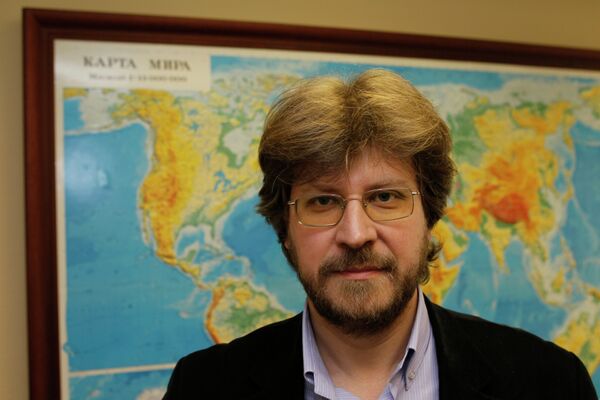On Sunday night, Vladimir Putin, with tears in his eyes, addressed his supporters after the preliminary election results were announced. His display of emotion is understandable – Russia’s top politician had to fight for this victory much harder than in past elections. The change in the political atmosphere in the country, clearly expressed by the large-scale protests in Moscow this winter, compelled the prime minister to run a U.S.-style campaign. He visited most of the regions, held dozens of meetings with different social groups, published seven articles on all aspects of policy, created a lot of publicity for his campaign and reaffirmed his ability to mobilize his supporters.
Putin’s approval rating went up by about 2% per week during the last two months, which shows that his efforts were not in vain. Moreover, the protests played in his favor in a way – they motivated his supporters to go to the polls, whereas before they might have stayed home, believing the prime minister’s victory was assured. So, when he declared to his supporters “We won!” Putin had every reason to be emotional.
However, the joy of the victory will soon fade, and the challenges that lie ahead for Putin will not be easy. Russia faces numerous problems, one of which is conceptual in nature – the search for a political model to replace the one that worked relatively well in the 2000s but has been exhausted for objective reasons. This depends on the Russian leaders who will make decisions. However, Russia and its policy are strongly, almost fatally, dependent on a host of external factors that are beyond Moscow’s control. It can only react to them and basically do damage control.
What will happen in the European Union? The prospects of the world economy and the oil market, which have a decisive influence on the Russian economy, depend on the ability of the EU to overcome the eurozone crisis and, more broadly, the crisis of the European integration model. Will U.S. politicians manage to halt their runaway debt? Will the its financial system start to gradually recover? Will China be able to maintain the same growth rates as before, thereby remaining the engine of the world economy? What will happen in the Middle East, which plays a key role in the world energy market? The answers to these questions are unclear, and once they start to emerge, Russia will have to adapt its policy on the spot.
Domestic events are also a cause for concern. Despite Putin’s impressive win, the mood in the country has changed and the politically active part of society will demand progress, especially if some of the afore-mentioned uncertainties result in a crisis, instability and lack of confidence. A fresh groundswell of discontent (the current one will soon subside) would put the government in a difficult place.
In today’s interconnected world, turbulence inside a country resonates in the outside world. This happens not through the malice of certain actors but by virtue of how the global environment functions. As soon as instability inside a system becomes visible to the rest of the word, it begins to interact with external actors. Owing to information and communication links, these actors start to react, turning into catalysts of this instability. This creates a vicious circle, and the government of any state has to learn how to walk on thin ice. The suppression of protests could escalate them and lead to even greater external involvement. But allowing protests to proceed could also result in escalation, as they start growing and attracting global attention.
Russia is not the Arab world of course, and, luckily, there are a whole range of possibilities between surrender and a crackdown. Nonetheless, the choice of a course will always be burdened by numerous circumstances that may prevent the government from making an adequate decision. Still, it will always have to be decisive. Putin deserves sympathy – he has just won perhaps the most difficult job in the world.
*
Is Russia unpredictable? Perhaps, but one shouldn’t exaggerate – its randomness often follows a consistent pattern. But is the world at large predictable? The past two decades have seen all forecasts refuted more than once and have taught us only one thing – to be ready for any change. This column is on what the nations and governments are facing in the era of global uncertainty.
Fyodor Lukyanov is Editor-in-Chief of the Russia in Global Affairs journal – the most authoritative source of expertise on Russian foreign policy and global developments. He is also a frequent commentator on international affairs and contributes to various media in the United States, Europe and China, including academic journals Social Research, Europe-Asia Studies, Columbia Journal of International Affairs. Mr. Lukyanov is a senior member of the Council on Foreign and Defense Policy and a member of the Presidential Council on Human Rights and Civic Society Institutions. He holds a degree from Moscow State University.
Uncertain World: Vladimir Putin in a World of Risks and Danger
Uncertain World: Why Does Russia’s Stance on Syria Baffle Everyone?
Uncertain World: Medvedev’s Foreign Policy: Period of Stabilization
Uncertain World: Anti-Americanism in Russia
Uncertain World: Will Russia Lose Georgia for Good?
Uncertain World: What Russia thinks of Syria
Uncertain World: The End of the Post-Soviet Era
Uncertain World: The war of nerves around Iran
Uncertain World: The Arab Spring in global context
Uncertain World: Russia-United States – minimizing the damage

